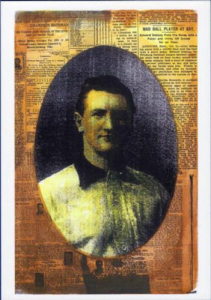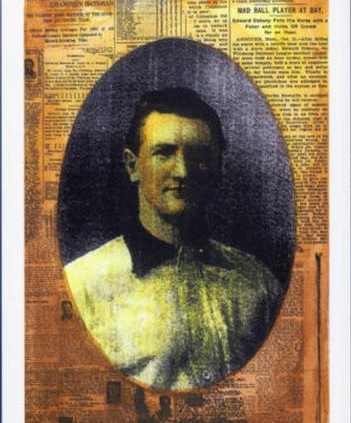Ed Doheny
 Ed Doheny’s career in major league baseball was a tale of two cities: mediocrity in New York followed by success in Pittsburgh. Then, on the brink of stardom, Doheny succumbed to an illness that not only ended his baseball career, but plunged him into a personal abyss from which he never escaped.
Ed Doheny’s career in major league baseball was a tale of two cities: mediocrity in New York followed by success in Pittsburgh. Then, on the brink of stardom, Doheny succumbed to an illness that not only ended his baseball career, but plunged him into a personal abyss from which he never escaped.
Edward Richard Doheny was born in Northfield, Vermont, on November 24, 1873. Both his father, James, and his mother, Mary, were Irish immigrants. Northfield land records indicate that James’ occupation was “laborer,” and the modest cottage on the east side of King Street where the Dohenys lived still stands at the foot of Turkey Hill. A sandlot star in his hometown at age 14, Ed soon outgrew the competition he could find in central Vermont.
Graduating to the minor leagues, Doheny crossed the Canadian border in 1894 and pitched for Farnham, Quebec. The next year he returned to Vermont and pitched for St. Albans. That year a Boston sportswriter earned $100 for putting the National League’s New York Giants on to Doheny. Major-league success seemed at hand for the 21-year-old Vermonter, whom the Boston Globe described as a “stonecutter”.
Making his big league debut on September 16, 1895, Ed started three games for the Giants that season and lost all three. In the 26 innings he pitched, Doheny gave up 37 hits, 19 walks, three hit batsmen and four wild pitches while watching 22 runs cross the plate. It was far from an impressive beginning, but still he showed potential. After his second outing, a 13-5 loss, the New York Times wrote, “Doheny, though slaughtered, showed the earmarks of a ballplayer.”
Ed steadily improved during the next two seasons, whittling his career ERA down to 3.08 despite a lifetime record of 10-14 to that point. Though his innings pitched were too few to qualify for the league title, Doheny sported an ERA of 2.12 in 1897 (teammate Amos Rusie, who pitched considerably more innings, led the league at 2.54). One reason he pitched so infrequently was his suspension from the team for “breaches of discipline.”
Whether that suspension was deserved is difficult to determine this far after the fact. On the one hand, as his later problems showed, Doheny’s behavior could be as wild as his pitching often was. On the other hand, it was his misfortune to join the Giants in their first year under Andrew Freedman, who has been called one of the most hated team owners in baseball history. According to his obituary in The Sporting News, Freedman “had an arbitrary disposition, a violent temper, and an ungovernable tongue in anger which was easily provoked, and he was disposed to be arbitrary to the point of tyranny with subordinates” — hardly an ideal boss for a man as unstable as Doheny.
Sometimes Doheny returned to Vermont during suspensions. On one such occasion he took the mound in his home state in a Northern League match-up against Norwood Gibson. A few years later, when Gibson was pitching for the Boston Pilgrims, H.L. Hindley of the Brattleboro Reformer recalled the game:
The good work that young Gibson, pony pitcher, is doing for the Boston Americans reminds me of Gibson’s last appearance in a Vermont league. He was pitching for Plattsburgh, and Mike Powers, now backstop for the Philadelphia Athletics, was behind the bat. St. Albans had Doheny, the famous Pittsburgh southpaw, who was then on New York’s suspended list and playing independent ball. Gibson had held St. Albans level for eight long innings, then Plattsburgh got a score in the ninth, St. Albans tying it in her half. It was up to Gibson for the tenth, as Doheny had blanked Plattsburgh and St. Albans needed only one to win. Then the little lad from Notre Dame got his.
I said it was a hard game, Gibson pitching against a National Leaguer, and, in that fatal tenth, Doheny went down to the coaching lines and opened up a Dad Clarke repertory of talk. He called attention to Gibson’s fatigue, to his lady-like delivery, to various points of interest in his personal appearance, while Mike Powers was too mad to talk. He merely knelt and prayed that the little lad would burn ’em over. Gibson did his best, but the strain was telling and pretty soon a little Texas Leaguer got a St. Albans man to first and Doheny was up to bat!
The big fellow with the larboard wing saw it was up to him to win the game and he grinned on Gibson with a sardonic smirk as he swung the willow experimentally and told the spectators what he would do. The pitcher wasn’t worrying much, for Doheny never could hit, but he carelessly sent over a fast, straight one and the man at bat just naturally banged it to deep right field, and, before the ball could be fielded in, darkness and all, the man on first was home and it was all off. And no disgrace to Gibson, either.
Actually Doheny was a lifetime .198 hitter, pretty good as pitchers went in the deadball era. He even batted .345 for New York during one half-season.
By 1898 Ed Doheny seemed to be back in favor with Freedman, and he was even named the Giants’ Opening Day pitcher. Finally Ed appeared to be on the verge of fulfilling the more positive hints he had displayed in his first three years. At times he did achieve some extraordinary feats. On August 15, 1899, for example, he made his own distinct mark in the baseball record book by striking out Louisville’s Pete Dowling five times in a single nine-inning game. And on May 25, 1899, he pitched a masterful four-hit game only to lose because the opposing pitcher, future teammate Deacon Phillippe, threw a no-hitter.
For the most part, however, the 1898-1900 seasons proved disastrous for Doheny: he lost 50 games while winning only 21, and each year his ERA increased, as did his wildness. His low point was 1900, when he went 4-14 with a 5.51 ERA, his highest since his rookie season.
In 1901 Doheny’s luck seemed to change, and so did the results of his pitching labors. He was traded in midseason from the Giants to the Pittsburgh Pirates, then the best team in the National League. For the first half of the season, pitching irregularly, Doheny went 2-5 for the Giants. But with his new team he was 6-2 for the rest of the 1901 season. Of course, pitching for a team that was running away with the National League pennant didn’t hurt his record any. The Giants never finished higher than seventh with Doheny, but the Pirates finished in first place each of Ed’s three seasons in the Steel City. He won more games in two and a half years in Pittsburgh than he had in six and a half in New York. Doheny became a mainstay in one of the N.L.’s best rotations, which also featured Phillippe, Jesse Tannehill and Hall-of-Famer Jack Chesbro.
Ed Doheny was 16-4 in 1902 and his .800 winning percentage was second-best in the National League. In 1903 he racked up another 16 victories and helped the Pittsburgh staff establish an N.L. record six consecutive shutouts. In fact, Doheny set the new record by recording the fourth shutout of the streak, a 9-0 defeat of the Boston Beaneaters.
Ed Doheny should have taken his success to even greater heights in Pittsburgh. He should have been part of an excellent Pirate staff for years to come, pitching for an owner, Barney Dreyfuss, considerably different from Andrew Freedman. He should have appeared in the first modern World Series and received a share of the proceeds. But lurking in his psyche was an illness that not only denied him more success but doomed him to disaster.
Off to a 12-6 start to the 1903 season, Doheny began exhibiting strange behavior, which was reportedly exacerbated by his consumption of alcohol. First he had a few unpleasant altercations with teammates. Later he started believing he was being followed by detectives. When he left the team without permission towards the end of July, the Pittsburg Post reported that act with a pitiless but starkly revealing headline: “HIS MIND IS THOUGHT TO BE DERANGED.”
After a few weeks of rest at his home in Andover, Massachusetts, Doheny returned to the Pirates in Boston during an August road trip. He pitched well, improving his record to 16-8, but another series of behavioral mishaps beset him, finally causing his sanity to be questioned. Granted a leave of absence by the Pirates, he was escorted home to Andover by his clergyman brother on September 22, 1903, and placed under the care of a physician.
Though he received daily medical care, Ed’s condition did not improve. Nothing seemed to help, not even a gift of his uniform from the Pirates, which Doheny interpreted as a rejection of his belief that he would someday return to the team. During the first modern World Series, while the A.L.’s Boston Pilgrims were upsetting his former teammates, Doheny suffered a breakdown that knocked him out of the game for good. On October 10 he threw his doctor head-first out the door of his home and warned him not to return; then in the early morning of October 11 he attacked and felled his male nurse, Oberlin Howarth, with a cast-iron stove leg. Howarth was seriously injured but eventually recovered.
Doheny’s wife hurried to the neighbors for assistance, but for more than an hour Ed held a score of neighbors and several policemen at bay, defying them and threatening to kill the first man who attempted to take him. Finally Chief of Police Frye and Officer Mills caught him off his guard and overpowered him, and after an examination by two physicians he was declared insane and committed to an asylum in Danvers, Massachusetts (the same place where Jimmy Piersall of the Boston Red Sox was institutionalized half a century later).
By 1905 his condition had worsened. A Lowell newspaper reported, “Mrs. Doheny writes that her husband — the pitcher — shows no sign of improvement at Danvers State Asylum and will never recover his reason. [He’s] not able to recognize anybody.” Though he lived 13 more tormented years, Ed Doheny never recuperated from his mental illness, never pitched again — and died in another Massachusetts institution, the Medfield State Asylum, on December 29, 1916.
Thus closed the stormy life of one of the most talented of Vermont ballplayers, tragically struck down just as he was overcoming his early problems and establishing himself as one of baseball’s winningest pitchers. Indeed, Doheny held a well-deserved spot in baseball’s best pitching rotation, and was still shy of his 30th birthday. Whatever dark demons controlled his troubled psyche, they turned his life upside down. What-might-have-been never was for Ed Doheny — instead of realizing his dreams of glory, he plunged into a nightmare from which he never awoke.
Sources
A version of this biography originally appeared in Green Mountain Boys of Summer: Vermonters in the Major Leagues 1882-1993, edited by Tom Simon (New England Press, 2000).
In researching this article, the author made use of the subject’s file at the National Baseball Hall of Fame Library, the Tom Shea Collection, the archives at the University of Vermont, and several local newspapers.
Full Name
Edward Richard Doheny
Born
November 24, 1873 at Northfield, VT (USA)
Died
December 29, 1916 at Medfield, MA (USA)
If you can help us improve this player’s biography, contact us.


